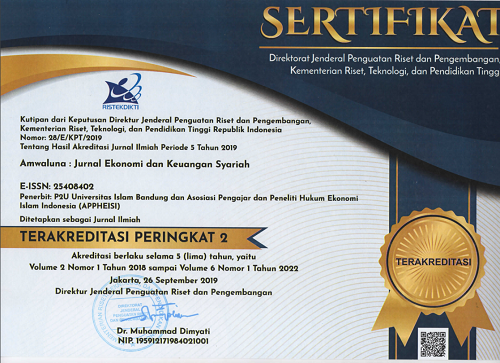ISLAMIC WEALTH MANAGEMENT: STRATEGIES IN SHARIA-BASED FINANCIAL PLANNING AND MANAGEMENT
Abstract
The research aims to formulate and implement proper wealth management based on Sharia, so, it can help in achieving individual goals in financial management. Qualitative research approaches are used with consideration of low awareness in financial planning, so, it requires in-depth analysis in the formulation and implementation of sharia-based wealth management in order to be more realistic. As a form of implementation of maqasid syariah to achieve falah in the world and the hereafter. The results of this study are the utilization of Islamic wealth management on financial planning, starting from the stages of planning, implementation, supervision and evaluation of plans, to ensure the wealth will yield the benefit in the world and in the hereafter.
Keywords
Full Text:
PDFReferences
Abdullah, Amalina, dan Jumaina Muhammad. 2013. “Ethical Values in Islamic Financial Planning”. Jurnal Pengurusan, (38): 133-140.
Abdullah, Naziruddin, Alias Mat Derus, Husam-Aldin Nizar Al-Malkawi. 2015. “The Effectiveness Of Zakat In Alleviating Poverty and Inequalities: A Measurement Using A Newly Developed Technique”. Humanomics, 31 (3): 314-29.
Ahmed, Habib dan Ak Md Hasnol Alwee Pg Md Salleh. 2016. “Inclusive Islamic Financial Planning: A Conceptual Framework”. International Journal of Islamic and Middle Eastern Finance and Management, 9 (2): 170-89.
Amanda, Farisah, Bayu Taufiq Possumah, Achmad Firdaus. 2018. “Consumersm in Personal Finance: An Islamic Wealth Management Approach”. Al-Iqtishad: Jurnal Ilmu Ekonomi Syariah, 10 (2): 325-40.
Budiantoro, R., Fitroh Sukono Putra, F., & Chasanah, A. (2020). “Wealth Allocation Framework: Dalam Kerangka Maslahah”. Benefit: Jurnal Manajemen dan Bisnis, 5(1): 96-108.
Choirunnisak. 2017. “Konsep Pengelolaan Kekayaan dalam Islam”. Islamic Banking, 3 (1): 27- 44.
Dusuki, Asyraf Wajdi and Said Bouheraoua. 2011. “The Framework of Maqasid Al-Shariʿah and Its Implication For Islamic Finance”. Islam and Civilisational Renewal, 2 (2): 316-36
Ghozie, Prita Hapsari. 2014. Make It Happen (Buku Pintar Rencana Keuangan Untuk Mewujudkan Mimpi). Jakarta: PT. Gramedia Pustaka Utama.
Hafidhuddin, Didin dan Hendri Tanjung. 2003. Manajemen Syariah dalam Praktik. Jakarta: Gema Insani Press.
Iqbal, M. 2008. Dinar Solution. Jakarta: Gema Insani Press.
Jazil, Thuba. 2017. Perencanaan Keuangan Islami, Why Not?, (online), https://tazkia.ac.id/2017/09/24/perencanaan-keuangan-islami-why-not/,
Luther, R., Linda Jane Coleman, Mayuresh Kelkar dan Gregory Foudray 2018. “Generational Differences In Perceptions of Financial Planners”. Journal of Financial Services Marketing: 1-16.
Mingka, Agustianto dan Luthfi Trisandi. 2010. Fiqh Keuangan Syariah. Jakarta: Muda Mapan Publishing.
Mukhlisin, Murniati. 2013. Sakinan Finance (Solusi Mudah Mengatur Keuangan Keluarga Islami). Solo: Tinta Medina.
Nawi, Hafizah Mat. 2018. “Financial Planning Framework: Empirical Evidence on Muslim Households in Malaysia”. Canadian Social Science, 14(5): 11-16.
Oluwanisola, Abdul Azeez, dan Abdul Wahab. 2014. “A Review of Islamic Financial Planning Process in Oman and Nigeria”. International Journal of Management Sciences, 2 (8): 383-90.
Putri, Ida Kurnia. 2016. “Financial Planning For Islamic Economics Students In Yogyakarta.” Journal of Islamic Economics Lariba, 2 (1): 17-24.
Safari, Meysam, Shaheen Mansori and Stephen Sesaiah. 2016. Personal financial planning industry in Malaysia: a market survey. The Journal of Wealth Management, 18(4): 29-35.
Safari, Meysam, Shaheen Mansori and Stephen Sesaiah, 2017. Generation difference in hiring financial planners in Malaysia. International Journal of Bank Marketing, 35(4), 583-95.
Suwiknyo, Dwi. 2009. Tarbiyah Finansial. Yogyakarta: Diva Press.
DOI: https://doi.org/10.29313/amwaluna.v5i2.6428
Refbacks
- There are currently no refbacks.
Editorial Office:
Syariah Faculty, Universitas Islam Bandung
Jalan Tamansari No. 24-26 Kota Bandung

Amwaluna : Jurnal Ekonomi dan Keuangan Syariah is licensed under a Creative Commons Attribution-NonCommercial-ShareAlike 4.0 International License.







